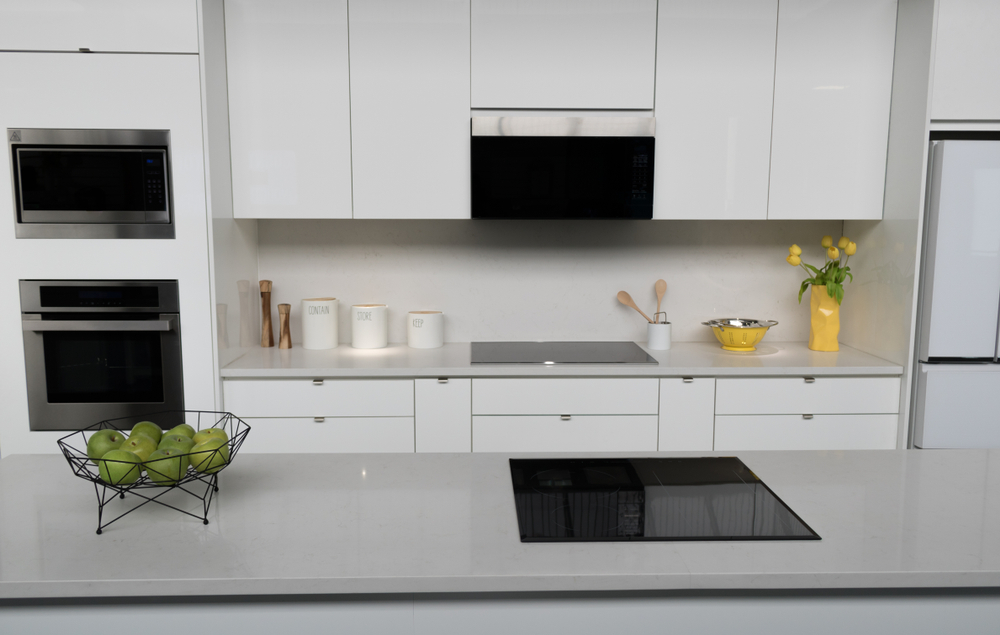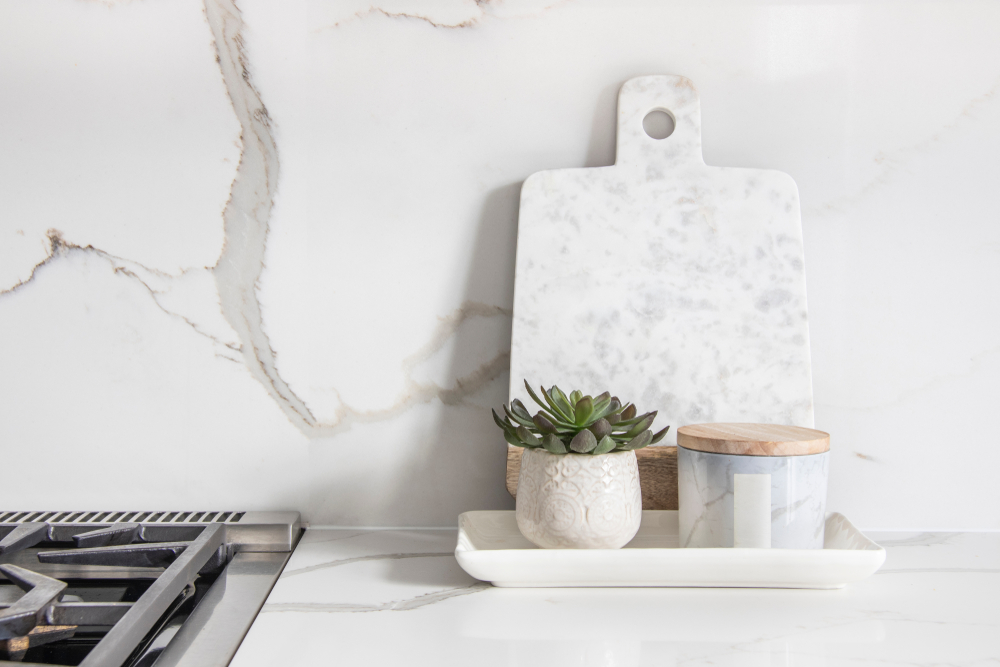
December 7, 2022
How to Clean & Care for Quartz Countertops
Industrially-made quartz became a popular design choice for kitchen countertops, and for a good reason. It boasts remarkable durability and a luxurious gleam of natural stone, while being less expensive and much easier to maintain. Nonetheless, cleaning and taking care of quartz counters has its caveats, and in this guide, we will tell you about all dos and don’ts of quartz countertop cleaning.
Proper Maintenance of Quartz Countertops
Unlike quartzite, which is a naturally formed rock, quartz is artificially fabricated by mixing natural quartz crystals with silica (poly resin) sands and different pigments to create stunning design patterns. Resin content makes quartz countertop material nonporous and, thus, absolutely water-, bacteria-, and mildew-resistant. However, industrial quartz still has its weak points, and cleaning such countertops requires avoiding everything that can disintegrate the material. These care tips will help you maintain the sparkling sheen of your quartz counters for long years.
- Clean up all kitchen messes immediately. Even though liquids like wine, tea, coffee, ketchup, or soda are unlikely to leave permanent stains on quartz counters, they can cause quartz discoloration if left to dry for too long.
- Avoid contact with acids. You should protect your quartz counters from everything acidic (be it a citrus drink or a homemade vinegar cleaner) because acids can disintegrate the bonds between poly resins and quartz, causing permanent damage to the countertop surface.
- Protect from sunlight. If you have big windows or skylights in your kitchen, too much sunlight can make your quartz counters yellow with time. Consider using a special cleaner with UV filters for quartz surfaces.
- Beware of aggressive deep cleaning. Quartz counters are better off if cleaned regularly with mild cleaning solutions (soapy water, for example) rather than once in a while with harsh cleaners that can damage the surface.
- Do not put hot pots directly on quartz counters. Direct contact with hot objects (over 300 degrees Fahrenheit) can change the chemical state of poly resin binders, which may lead to surface discoloration. Using silicon trivets and other types of hot pads helps protect your gorgeous counters.
- Do not cut food on it. Even though quartz counters are durable and scratch-resistant, prepping food directly on the quartz surface is not recommended. Firstly, sharp objects like knives dull the surface. And secondly, cutting on the hard quartz surface makes a knife dull. Mutual hostility.

How to Keep Quartz Countertops Clean
Counters made of quartz are absolutely water-friendly, which makes them very easy (and cheap) to clean. Most of the time, you won’t need any special cleaning supplies. Here are several cleaning options for quartz counters.
Cleaning with Dish Soap
Daily kitchen mess on quartz counters can be easily cleaned with warm soapy water and a non-abrasive sponge. Apply some dish soap on a wet sponge, make some foam and wash the countertop with it. After that, remove soapy residue with a clean microfiber cloth. If you clean your counters this way every evening and mind cleaning the food spills right away, your counters will shine happily and won’t need anything stronger than dish soap.
Cleaning with Glass Cleaner (Windex)
There are many conflicting tips concerning cleaning quartz counters with glass cleaners such as Windex. We recommend using it with caution or skip this cleaning supply at all because of its alkaline PH value that can potentially destroy the bonds between resins and quartz crystals. So consult your countertop manufacturer prior to using Windex, or better stay on the safe side and go with milder and proven cleaning options such as dish soap or rubbing alcohol.
Cleaning with Rubbing Alcohol
Isopropyl alcohol (also known as rubbing alcohol) is a safe and effective cleaning option for quartz counters. You can use it as a regular counter cleaner for more difficult buildups, as a stain remover, or as a countertop polish whenever you want to give your counters a luster boost. To prepare your everyday homemade countertop cleaner, mix rubbing alcohol with water in 1:1 ratio (or more alcohol) in a spray bottle. Spray it over the surface, leave it for a couple of minutes to work, and wipe the counter with a microfiber cloth.
Cleaning Stains off Quartz Countertops
Troubles happen, and sometimes you find your counter covered with stains of non-organic nature where mild dish detergent falls short. To get rid of rigid stains such as nail polish, hardened glue, or permanent marker, first, try using undiluted rubbing alcohol. If it doesn’t help, try tackling it with Goo Gone cleaner or a similar product. Just apply it on the stain, let it soak for several minutes, and wipe the product off with a microfiber cloth. Don’t forget to rinse the counter with clean water and wipe it down with a dry microfiber cloth.
Degreasing Quartz Countertops
Frying meat or cooking something using fats may leave your quartz counter near the stove top all covered with greasy splashes. Feel free to use kitchen degreasers (such as Krud Kutter or similar) to restore your counter’s uncompromised sheen. Before buying a degreaser, carefully read the label to ensure it doesn’t contain bleach, which is harmful to quartz counters. Even though most degreasers are safe for quartz cleaning, do not leave them spread on the surface for a long time, and always rinse your counter with pure water right after cleaning.
What Should You Not Use to Clean Quartz Countertops
You should avoid using cleaning agents and products that can damage the quartz integrity by destroying the binding between poly resins and quartz crystals:
Abrasive cleaners and scouring pads. Quartz is scratch-resistant when it comes to regular use, but not when you scrub it intentionally with hard objects and force applied. If you need to remove stuck, hardened food, first soak it with soapy water and then mildly scratch it with a dull knife (better use a disposable plastic or wooden one) to remove dirt.
Too acidic or too alkaline cleaning products. Everything that is at the extremities of PH grade can cause discoloration and dull your quartz counter surface. So avoid using Clorox wipes, bleach, drain cleaners, oven cleaners, turpentine, dishwasher rinser, and other aggressive chemicals. If you have to use them on other surfaces in your kitchen, ensure the product does not get on the counter.
Knowing how to take care of luxury quartz kitchen countertops can save you from accidentally ruining the expensive interior you love so much. If you are not into cleaning chemistry, or you are simply too busy for everyday cleaning, you can always rely on White Glove Cleaner for your regular cleanups. Contact us today to schedule a kitchen cleaning, deep cleaning, or routine cleaning service in New York City.
